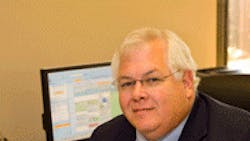Greensboro Strives to Put the Service in Development Services
When it comes to industrial expansion or relocation projects, Greensboro, N.C., Assistant City Manager of Economic Development Andy Scott has learned that time is of the essence.
"If we can do anything on our end to reduce the amount of time and the trouble and expense of the review process, it's something to our benefit, because that makes us more competitive with other locations," Scott says. The city had that objective in mind when it established the Greensboro Development Services Center earlier this year. The center consolidates the city's key technical-review, permitting and building-inspections staff members from three separate buildings into one. Staff members from every department needed to approve a development plan are available Monday through Friday mornings to review sketch plans and hold technical-review committee meetings.- Pre-development meetings that allow any interested party to obtain zoning information on how a piece of property can be developed for commercial or residential construction.
- Electronic plan submission and review. Thanks to an interactive whiteboard with touch-screen technology, city staff members can project, review and edit a developer's plan on-screen, so a developer can leave the meeting with a revised plan in hand.
About the Author
Josh Cable
Former Senior Editor
Former Senior Editor Josh Cable covered innovation issues -- including trends and best practices in R&D, process improvement and product development. He also reported on the best practices of the most successful companies and executives in the world of transportation manufacturing, which encompasses the aerospace, automotive, rail and shipbuilding sectors.
Josh also led the IndustryWeek Manufacturing Hall of Fame, IW’s annual tribute to the most influential executives and thought leaders in U.S. manufacturing history.
Before joining IndustryWeek, Josh was the editor-in-chief of Penton Media’s Government Product News and Government Procurement. He also was an award-winning beat reporter for several small newspapers in Northeast Ohio.
Josh received his BFA in creative writing from Bowling Green University, and continued his professional development through course-work at Ohio University and Cuyahoga Community College.
A lifelong resident of the Buckeye State, Josh currently lives in the Tremont neighborhood of Cleveland. When the weather cooperates, you’ll find him riding his bike to work, exercising his green thumb in the backyard or playing ultimate Frisbee.
